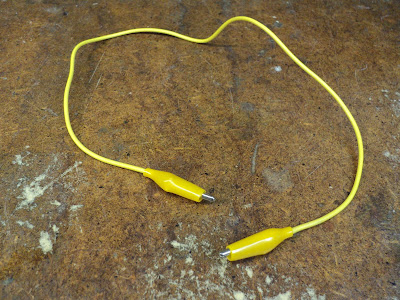Some cheap electrical connection goods, like the 20" alligator clip jumper lead pictured below, make use of a species of 'crimp' connection that's scarcely fit to be called a 'connection'.
The bared end of a wire is simply folded back onto its insulation. The wire end is laid into a receiving channel, and the channel is squeezed closed over the works.
The connection attained that way is iffy at best. Flakiness and outright openess are not uncommon. The only fix is to open up the 'crimp' with a fine sidecutter (as I've done in the photo above), make a soldered connection and re-close the 'crimp'.
I had one of these connection types give me the gears on a small engine recently. The connection was in a bullet-style pin for the kill switch circuit. It went open and the engine couldn't be switched off. Soldering the connection fixed that trouble.
If a piece of electrical gear has such connections in it and it's behaving erratically, odds are good that it's a fake crimp connection that's at fault.
- - -
Update -- FRIDAY, MARCH 15, 2019
Here's an improvement to the alligator clip leads -- add a one inch length of 2mm or 3/32" heat shrink tubing to the wire right where it meets the alligator clip.
One ends up with a nicely strain-relieved lead end.
# # #
# # #









Crimped connections are fine on connectors that have two stage crimps. One for the insulation and another for the wire. This is common on 0.1" headers and computer Molex connectors. Those are never soldered.
ReplyDeleteThese alligator clips are also using thinner wire than intended, and the cheap ones often have copper clad aluminum wire, or even straight aluminum now. Copper costs too much.
I agree. But the 'crimps' on the alligator clip leads aren't really crimps at all. At best, one could call them a 'pressure' connection. A true crimp is made with such force that it's gas-tight; that's what makes proper crimp connections so reliable.
DeleteAnyway, thanks for writing,
Tom